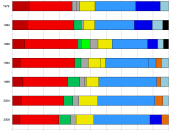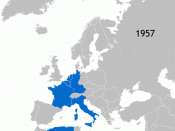EU Business and Law
Final Assignment
ESG MBA Program
New York College
Semester: Spring 2011
4/14/2011
The Free Movement of People
The European Union (former European Community) is an institutional join of twenty - seven countries that aims to the creation of a strong and united Europe. The particular framework was firstly introduced in 1950's by six founding independent countries - states and now it encompasses the participation of twenty seven member states. The main goal of this institutional effort is to enhance the sense of unity and cooperation in sociopolitical and economic level. In this framework, EU introduced the term "Internal Market" and the fundamental rights of the so-called EU freedoms - free movement of citizens, goods, services and capital. In this essay we will examine closer one of those fundamental rights, the free movement of people.
According to the free movement of people, the citizens of EU have the right to work, study, live and/or retire freely within the borders of EU.
This freedom allows EU citizens to move from one independent state to another freely as if moving to the same state. The elimination of any internal borders within the internal market and the equal treatment of citizens from other member states is the core idea of the free movement of people.
The Legal Framework
The formulation of the framework that the particular freedom could be enforced took many years, and a number of Treaty provisions and secondary legislation came out, as a step by step process:
"Art. 12 TEC: prohibits discrimination on grounds of nationality within the scope of application of TEC;
Art. 17 TEC: established citizenship of the EU (any person who has a MS citizenship is an EU citizen);
Art. 18(1) TEC: established the right of free movement and residence of EU citizens;
Art. 39 TEC: established free movement of workers;
Art. 43 TEC: established freedom of establishment (free movement of the self-employed);
Art. 49 TEC: established freedom to provide services
And the original fragmentary legislation:
Regulation 1612/68 on freedom from discrimination in employment;
Directive 64/221 on derogation on grounds of public policy, public security or public health
Directive 68/360 on rights of workers of their families;
Directive 73/148 on rights of the self-employed and their families;
Directive 75/34 on the right to remain after employment has ceased"
All the aforementioned secondary legislation finally led to the main EU Regulation and Directive of the freedom of movement of citizens, the free movement of workers and the Citizenship Directive:
Art. 45 TFEU (ex 39 and 48) that established the free movement of workers
Directive 2004/38 /EC of 29 April 2004 on the right of EU citizens and their family members to move and reside freely within the territory of the Member States (http://eur-lex.europa.eu ).
Consequently, the core principle of free movement of people encloses two sub-categories:
The free movement of economically active people
The free movement of non - economically active people
Firstly, the free movement of workers states in specific that:
Free of movement for workers is a fundamental principle of the Union
The applicability of the particular freedom encloses the prohibition of any discrimination on grounds of nationality and in terms of employment
The freedom of movement of workers encloses rights on public health, public security or public policy (with some limitations) as regards:
the acceptance of employment offerings made
the free movement within the internal market of the EU to do so
the ability to remain in a participant state for this purpose and in accordance with the legal framework that stands for the domestic workers of the state
the ability to remain in the member state after the employment period, according to the commission regulatory frame
The public service is excluded by any above-mentioned provisions
These rights also stand for the family members of the worker, whether they are from EU states or not. No matter the nationality of the family members, they also enjoy these rights, with sole provision the occasional possible requirement of a free of charge entry visa for the non EU citizens
(http://en.wikipedia.org ).
As we mentioned above, after the Maastricht Treaty, the free movement rights of economically active persons within the EU were followed by the introduction of rights for non-economically active citizens too.
Thus, secondly, the free movement of non - economically active people states in specific that:
Citizenship is one the fundamental EU rights and it is based on the core of the creation of unified EU. All the citizens of EU have the right, (under some limitations and preconditions), to freely move and reside within the Union's territory, even if the purpose of visit is not related to employment
The citizenship Directive merges previous secondary legislation against the belief that non - economically active people have no rights regarding move and reside within EU deriving from previous treaties
This right also stands for the close family members that are not EU citizens
After the period of five years, the right to reside becomes permanent, with the abolition of any preconditions required. The latter consists the true sense of EU Citizenship
(http://en.wikipedia.org ).
Directive 2004/38 and Conclusions
As a result of the Directive 2004/38 a number of conclusions were adopted according to which:
The Council and the Communication of the Commission to the European Parliament will take part to the transposition and application of the Directive, setting guidelines
The Council's conclusions in November 2008 point out that:
The freedom of free movement of people is one of the core concepts of a united Europe
All necessary measures and actions should be taken towards the applicability of the this fundamental right
Each Independent State should take the necessary actions against fraud and abuse and consider the enforceability of this fundamental right to be a priority
Common effort against fraud and abuse of this fundamental right may also include exchange of information between the member states
If a number of issues come up, then the Commission will come up with further additions - corrections
The role of Commission and the Guidelines
The role of the Commission after all is to reassure that the citizens of member states take advantage of their four EU freedoms. Towards this direction, the Commission is responsible for setting guidelines to help member states with the implementation of the Citizenship Directive. Through the guidelines the Commission aims to make as clear as possible the implementation of the directive, offering guidance to the transposition process. Therefore, Guidelines compose a very important part of the free movement of people right (http://www.statewatch.org ).
The Schengen area and cooperation
Finally, the so-called Schengen area and cooperation should also be mentioned as a crucial element of the formulation and enforcement of the free movement of people freedom. The Schengen area, in the first place, refers to the physical borders that the particular freedom is applicable and assured. Secondly, the Schengen cooperation was established in 1997 with the Treaty of Amsterdam. According to Schengen cooperation treaty, the executive and judicial authorities of Schengen members will cooperate to reassure the security and harmony within the Schengen area. Furthermore, may not all countries cooperating in Schengen belong to the Schengen area, nevertheless though the Schengen members share common rules regarding residence and entry to their territory
(http://europa.eu ).
Moving to a foreign county to work, study or reside is not an easy task. Migrants may have to face many difficulties and a great number of challenges and of various problems to overcome. Nevertheless though, around eight million EU citizens reside and work in a participant country. The latter points out the great importance of setting a concrete framework of protecting this fundamental right.
(http://www.ciett.org )
The European Union is based to the framework of a unified Internal Market. Towards this direction, four fundamental freedoms were issued. The freedom of goods, services and capital are all tools towards the realization of this single and united market. Nevertheless though, the fourth freedom, the free movement of people, is undoubtedly the core sense of Citizenship in forming a cohesive Union. The Freedom of movement of persons is a fundamental right of Member state citizens and one of the pillars of the European Union that unites people and not only economies. It aims to foster the EU united character and the abolition of any internal borders within the Internal market. As a result the competitiveness of EU economy is enhanced and millions of EU citizens have the right to work, live, reside and travel in general for business or pleasure within the Union.
References:
http://eur-lex.europa.eu/LexUriServ/LexUriServ.do?uri=OJ:L:2004:229:0035:0048:EN:PDF
http://en.wikipedia.org/wiki/Freedom_of_movement_for_workers
http://en.wikipedia.org/wiki/Directive_2004/38/EC_on_the_right_to_move_and_reside_freely
http://www.statewatch.org/news/2011/jan/eu-council-conclusions-free-movement-sept-2009.pdf
http://europa.eu/legislation_summaries/justice_freedom_security/free_movement_of_persons_asylum_immigration/l33020_en.htm
http://www.ciett.org/fileadmin/templates/ciett/docs/ECAS_survey_on_the_free_movement_of_workers_with_the_EU25.pdf


